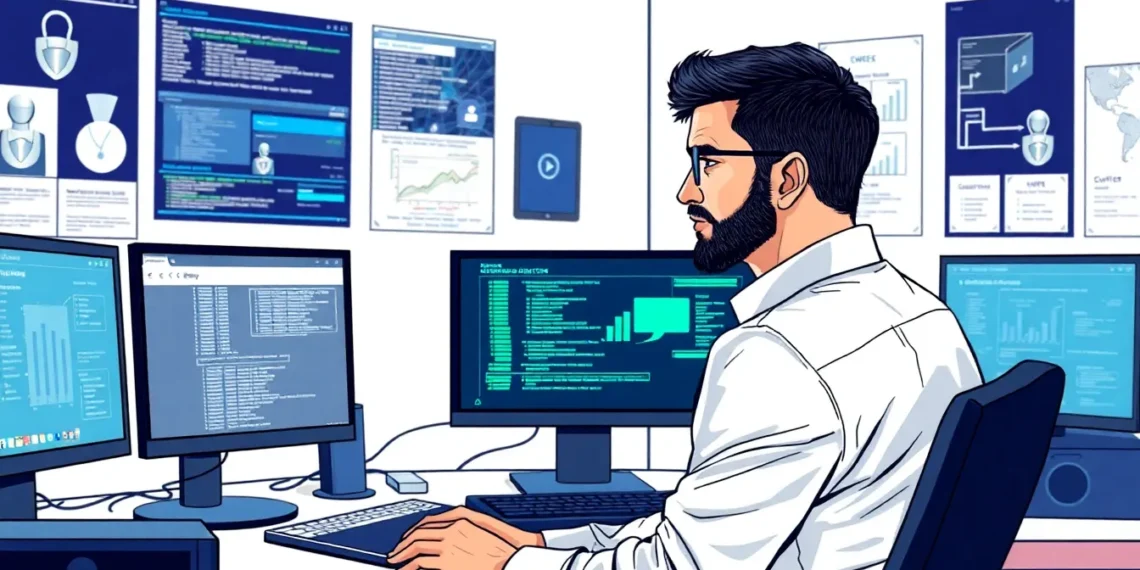In a world where the digital realm is both a playground and a battleground, understanding the difference between a hacker and a cybersecurity professional is crucial. Imagine hackers as the mischievous kids on the block, always looking for a way to sneak into the cookie jar. On the flip side, cybersecurity professionals are the vigilant parents, ensuring those cookies stay safe and sound.
What is The Difference Between a Hacker And a Cybersecurity Professional?
Hackers play a crucial role in the digital world, often operating in various capacities. They seek to manipulate systems and networks, sometimes for malicious intents and at other times for ethical purposes.
Definition of a Hacker
A hacker refers to an individual skilled in programming, network capabilities, and system exploitation. This expertise enables them to access unauthorized data or systems. While some hackers pursue harmful activities, others focus on improving security through testing and vulnerability assessments.
Types of Hackers
Multiple hacker categories exist, each defined by their motives and methods.
- Black Hat Hackers: These individuals breach systems with malicious intent, often to steal data, spread malware, or disrupt services.
- White Hat Hackers: Ethical hackers, commonly employed by organizations, identify vulnerabilities to safeguard systems from potential threats.
- Gray Hat Hackers: Operating in a morally ambiguous space, gray hat hackers may exploit vulnerabilities but typically disclose these findings responsibly to the affected parties.
- Script Kiddies: Generally less experienced, script kiddies use pre-existing tools to execute attacks without in-depth understanding.
- Hacktivists: These hackers engage in politically charged activities to promote a cause, implementing cyberattacks as forms of protest.
Role of Cybersecurity Professionals

Cybersecurity professionals act as guardians in the digital realm, ensuring that systems remain secure against potential threats. Their expertise lies in creating and maintaining robust defense mechanisms to protect sensitive information.
Definition of a Cybersecurity Professional
A cybersecurity professional specializes in safeguarding computer systems and networks from theft, damage, or unauthorized access. These experts possess a deep understanding of various security protocols, risk management strategies, and compliance regulations. They often hold certifications like Certified Information Systems Security Professional (CISSP) or Certified Ethical Hacker (CEH) that validate their skills and knowledge. Continuous education is vital, as the digital landscape evolves rapidly, and staying current with emerging threats and technologies becomes essential.
Key Responsibilities
Cybersecurity professionals perform a range of critical tasks to maintain security across organizations. They assess vulnerabilities in systems through regular audits and penetration testing. Developing security policies tailored to the specific needs of an organization is also crucial. Furthermore, they monitor networks for suspicious activities and respond swiftly to incidents. Training employees on security awareness helps mitigate risks associated with human error. Finally, they collaborate with other IT personnel to ensure a comprehensive security strategy that addresses the diverse challenges of cybersecurity.
Comparing Mindsets and Skill Sets
Hacker and cybersecurity professional mindsets differ significantly, influencing their approaches and goals.
Problem-Solving Approaches
Hackers often rely on creative, unconventional methods to exploit vulnerabilities. They think outside the box, using diverse tools and techniques to uncover weaknesses in systems. Cybersecurity professionals, in contrast, adopt systematic approaches focused on risk management and mitigation. They conduct thorough assessments, prioritize vulnerabilities, and apply security measures that align with established protocols. While hackers may embrace trial and error, professionals work methodically to prevent incidents and enhance security frameworks. Different motivations shape their problem-solving strategies, reflecting their unique roles in the digital environment.
Ethical Considerations
Ethics play a crucial role in distinguishing hackers from cybersecurity professionals. Black hat hackers typically disregard ethical standards, pursuing personal gain through illegal means. Their actions can harm individuals and organizations alike. White hat hackers, however, operate within ethical boundaries to protect systems and improve security. Cybersecurity professionals adhere to strict ethical guidelines, ensuring compliance with laws and regulations while safeguarding sensitive information. By fostering a culture of responsibility, they help maintain trust in the digital landscape, bridging the gap between intended actions and ethical responsibilities.
Consequences of Their Actions
The actions of hackers and cybersecurity professionals lead to significant consequences in the digital world.
Impact of Hacking
Hacking results in data breaches, financial loss, and compromised privacy for individuals and organizations. Black hat hackers exploit vulnerabilities, causing disruptions and impacting productivity. In 2021, cyberattacks cost businesses an estimated $6 trillion globally. Sensitive data theft brings lawsuits, regulatory fines, and reputational damage. Industries such as healthcare and finance suffer severely when hackers target their systems. An example remains the 2020 SolarWinds attack, which highlighted vulnerabilities in government and private sectors. Ultimately, the landscape of trust erodes when hacking incidents occur, leading to more stringent security measures needed.
Importance of Cybersecurity
Cybersecurity acts as a protective shield against the negative impact of hacking. Professionals in this field safeguard information, ensuring confidentiality, integrity, and availability of data. According to Cybersecurity Ventures, global cybersecurity spending is projected to exceed $1 trillion from 2021 to 2025. Organizations deploy risk assessments, regular security audits, and threat intelligence to defend against attacks. Additionally, training employees on security best practices reduces risks associated with human error. Collaboration across departments enhances overall security posture and prepares businesses for potential threats. Considering the rise in cyber threats, robust cybersecurity is essential for maintaining operational stability.
Conclusion
Understanding the difference between hackers and cybersecurity professionals is vital in today’s digital landscape. While hackers may exploit systems for various reasons ranging from malicious intent to ethical hacking, cybersecurity professionals focus on protecting systems and data. Their roles are complementary yet distinct.
As cyber threats continue to evolve the need for skilled cybersecurity experts becomes even more crucial. Organizations must prioritize robust security measures and foster a culture of awareness to safeguard against potential breaches. By recognizing the unique contributions of both hackers and cybersecurity professionals individuals and businesses can better navigate the complexities of the digital world.









